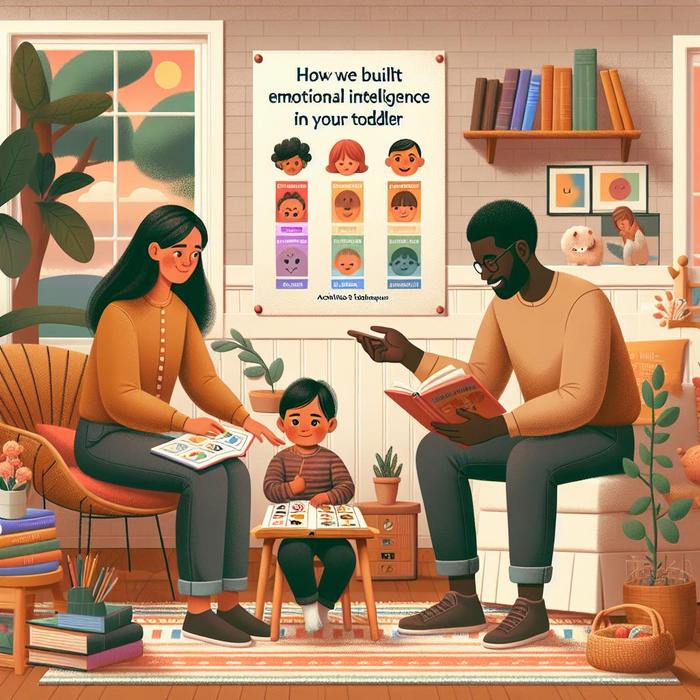Implementing Techniques Tailored for Your Toddler
In the world of child-rearing, nothing comes close to the importance of building emotional intelligence. Mastering this aspect of development is crucial as it underpins the child’s future social skills, positive behavior, and overall mental well-being. However, how do we incorporate lessons into our everyday routines in a way that our toddlers can understand and enjoy? Let’s delve into some toddler activities and techniques that can help build their emotional intelligence.
Translating Feelings into Words
One of the major steps in building emotional intelligence in toddlers is guiding them to identify their feelings and express them accurately. Just like teaching a child to name objects, we also need to teach them the names of emotions. You can start by describing your feelings and why you feel that way. For example, say “I’m happy because we’re going to the park”. Gradually introduce more complex emotions such as frustration, disappointment, or excitement. This not only develops their vocabulary but also helps them understand that feelings are natural and can be talked about openly.
Encouraging Empathy through Play
Playtime is more than just fun; it’s a goldmine of learning opportunities. By incorporating role-play scenarios, you teach your toddler to empathize with others. For example, using dolls or stuffed toys, you can simulate situations where one ‘character’ is sad, scared, or excited. Then, ask your toddler what they should do to help or how they would react in the same situation. This toddler activity fosters their capacity to understand and share someone else’s emotions.
Guidelines for Building Emotional Intelligence
To navigate this path effectively, here are some pointers:
- Acknowledge their feelings: Before rushing to fix the situation, acknowledge your toddler’s feelings. This teaches them that their feelings are valid and promotes self-understanding.
- Lead by example: Toddlers are keen observers. Demonstrating how to handle emotions appropriately can guide them in doing the same.
- Use books and stories: Literature is a fantastic way to explore emotions. Choose stories that illustrate various emotions and discuss them with your toddler.
- Practice patience: Building emotional intelligence is a long process. Celebrate small victories and be patient with setbacks.
Remember that every child is different and what works for one may not work for another. Be patient and flexible in your approach. You can also refer to our other blogs for more information on child development and parenting tips.
One of the most exciting parts of this journey is seeing the gradual formation of your toddler’s character and personality. As you imbue these activities and techniques into their daily routines, you will notice your toddler learning to manage their emotions, developing empathy, and engaging in positive behavior. All these are crucial steps in building their emotional intelligence.
Building a Healthy Emotional Environment
While implementing these techniques, it’s equally crucial to provide a safe, loving, and nurturing environment where your toddler can freely explore their emotions. An environment filled with excessive negative emotions or suppression of feelings can hinder your child’s emotional growth. As caregivers, it’s our role to establish a healthy emotional climate at home where all feelings are respected and have a place.
For example, instead of delegitimizing your child’s feelings like anger or sadness with statements like “you’re too young to feel this way,” try to understand why they feel like this and help them work through it. Remember, emotions aren’t wrong; it’s crucial for children to feel comfortable with a wide range of emotions and learn ways to express them appropriately. You can find useful tools and suggestions on Understood.org.
Involving Other Caregivers
In addition to parents, other caregivers, such as grandparents, teachers, or babysitters, can play a significant role in your child’s emotional development. They can provide reassurance, offer guidance, and create additional opportunities for your toddler to practice emotional skills. It’s important to ensure consistency in strategies across all caregivers for your toddler’s sustained emotional growth. Share your strategies with them to provide a unified approach to building your child’s emotional intelligence. Check this insightful Reddit thread for more input on the topic.
Teaching Gratitude
Gratitude is another essential aspect of emotional intelligence. By learning to be grateful, toddlers can appreciate the positive things in life, fostering their happiness and contentment. It’s quite simple to instill this virtue – you can start by thanking your toddler when they do something good and gradually encourage them to express gratitude to others. Also, daily reflective exercises, like discussing the best parts of the day, can help develop their understanding and expression of gratitude.
Encourage Kids to Help Others
Helping others is a sure-fire way to foster empathy and social skills, key components of emotional intelligence. Simple, age-appropriate tasks like helping set the table, watering plants, or sharing toys with friends can teach your toddler to consider others’ needs and feelings. Moreover, it demonstrates the joy of giving and helps them understand that their actions can influence others’ feelings – a crucial lesson of emotional intelligence.
Seek Expert Support When Required
While most of these strategies can be implemented by parents, sometimes, expert help might be required. If you notice your toddler struggles significantly with emotional regulation or displaying empathy, it might be beneficial to seek professional help. Emotional coaches or child psychologists can provide specialized strategies and interventions. Refer here for more guidance in this area.
In conclusion, remember that patience is key here. Emotional intelligence is not built in a day. So, keep providing varied opportunities for your toddler to grow emotionally, encourage open conversations about feelings, and give them lots of love and understanding. The emotional skills they learn now will stand them in good stead for a lifetime.

